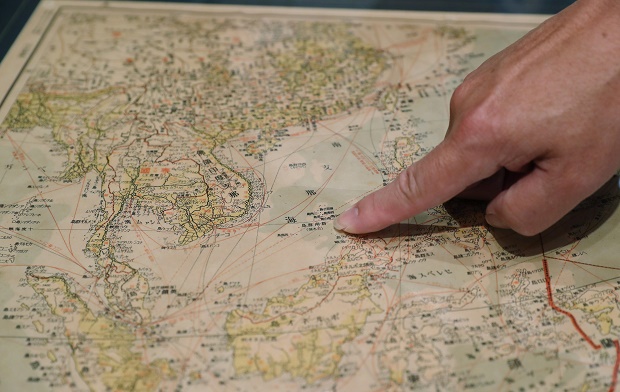
In this July 14, 2016 file photo, Marcopolo Tam, a member of a pro-China business group in Hong Kong, points to what is now known as the Spratly Islands in the South China Sea on a Japanese World War II era map purporting to support China’s claims to vast parts of the South China Sea, in Hong Kong. An international arbitration panel’s decision on the contested waters of the South China Sea so far is fueling regional tensions rather than tamping them down. In the ensuing 11 days, China has responded to the sweeping victory for the Philippines by flexing its military might. The Philippines faces pressure both at home and abroad not to cede an inch to China after the July 12 decision by a tribunal at The Hague-based Permanent Court of Arbitration. AP FILE PHOTO
China is likely to maintain its previous territorial claims, despite a tribunal ruling invalidating the nine-dash line that demarcates its claim to a large chunk of the resource-rich South China Sea, experts have said.
“States only comply with international law when it serves their interests,” Muhamad Arif, researcher at the Habibie Center think-tank, said on Tuesday during a discussion organized by the center in Jakarta.
READ: Beijing vows to continue South China Sea construction
Arif said international law had limited power, as it could not be enforced by any supranational authority and therefore did not have an independent role in governing states’ behavior. Such laws lack an agreed legitimate mechanism of enforcement, he added.
The Permanent Court of Arbitration (PCA) tribunal on the South China Sea dispute on July 12 centered on the applicability of the 1982 United Nations Convention on the Law of the Sea (UNCLOS), of which China is a signatory. However, Beijing insisted the PCA had no jurisdiction over the issue and boycotted the proceedings.
Center for Chinese Studies Foundation chairman Rene Pattiradjawane said China had invested too much for it to now take apart the fake islands, which it has built to boost its territorial claims across the vast waters. Despite recent high tensions in the disputed region, Rene noted that China would most likely employ self-restraint in order to avoid open conflict.
“China would be afraid of getting involved in a conflict considering how its economy is currently doing,” he added.
READ: Beijing closes South China Sea area, launches war games
RELATED VIDEOS